英文辩论出国留学的优缺点
国外留学的利与弊英语作文
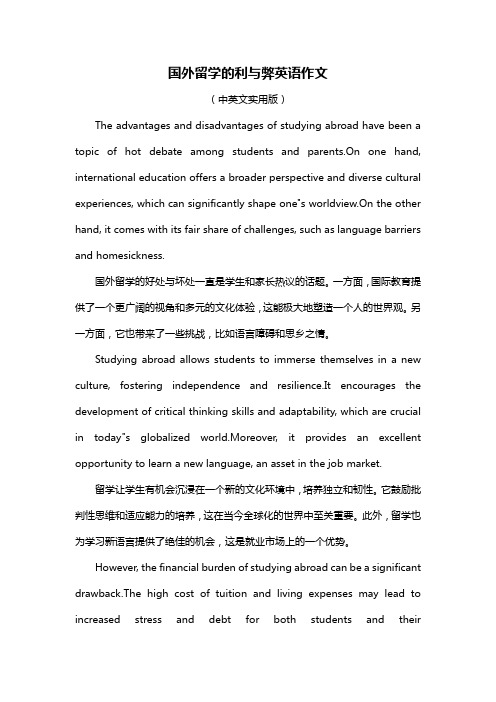
国外留学的利与弊英语作文(中英文实用版)The advantages and disadvantages of studying abroad have been a topic of hot debate among students and parents.On one hand, international education offers a broader perspective and diverse cultural experiences, which can significantly shape one"s worldview.On the other hand, it comes with its fair share of challenges, such as language barriers and homesickness.国外留学的好处与坏处一直是学生和家长热议的话题。
一方面,国际教育提供了一个更广阔的视角和多元的文化体验,这能极大地塑造一个人的世界观。
另一方面,它也带来了一些挑战,比如语言障碍和思乡之情。
Studying abroad allows students to immerse themselves in a new culture, fostering independence and resilience.It encourages the development of critical thinking skills and adaptability, which are crucial in today"s globalized world.Moreover, it provides an excellent opportunity to learn a new language, an asset in the job market.留学让学生有机会沉浸在一个新的文化环境中,培养独立和韧性。
出国留学的利弊 英语作文

出国留学的利弊英语作文Studying abroad offers both advantages and disadvantages. Let's delve into each aspect:Advantages:1. Cultural Exposure: One of the most significant benefits of studying abroad is the exposure to different cultures. Living in a foreign country allows students to immerse themselves in a new way of life, understand different customs, and broaden their perspectives.2. Language Proficiency: Being surrounded by native speakers accelerates language learning. Daily interactions in English (or any other foreign language) help improve language proficiency rapidly, both academically and socially.3. Quality Education: Many countries are renowned for their high-quality education systems. Studying abroadprovides access to top-notch universities and cutting-edge research facilities, offering an unparalleled learning experience.4. Networking Opportunities: Studying abroadfacilitates building international connections. Students interact with peers from diverse backgrounds, fostering valuable relationships that can benefit them personally and professionally in the future.5. Personal Growth: Living independently in a foreign country fosters personal growth and self-reliance. Students learn to adapt to new environments, overcome challenges, and become more resilient individuals.Disadvantages:1. Financial Burden: Studying abroad can be expensive, including tuition fees, accommodation, living expenses, and travel costs. For many students, financing their education overseas may pose a significant financial burden or even lead to debt.2. Culture Shock: Adjusting to a new culture can be challenging and may lead to culture shock. Differences in customs, social norms, and lifestyle can initially be overwhelming, causing feelings of loneliness or isolation.3. Language Barrier: While studying in a foreign country improves language skills, the initial language barrier can be daunting. Difficulties in communication may hinder academic performance or social integration, especially in the early stages of the journey.4. Homesickness: Being away from family and friends can trigger feelings of homesickness. Missing important events, holidays, and familiar comforts can take an emotional toll on students, affecting their overall well-being and academic focus.5. Legal and Administrative Challenges: Navigating a foreign country's legal and administrative processes, such as obtaining visas or work permits, can be complex andtime-consuming. Failure to comply with regulations mayresult in legal consequences or even expulsion from the host country.In conclusion, studying abroad offers invaluable opportunities for personal and academic growth, cultural enrichment, and international networking. However, it also comes with challenges such as financial strain, cultural adjustment, and homesickness. Ultimately, the decision to study abroad should be carefully weighed, considering both the benefits and drawbacks to ensure a fulfilling and successful experience.。
评价出国留学的利弊英语作文

评价出国留学的利弊英语作文The Pros and Cons of Studying Abroad.Studying abroad presents a unique opportunity for individuals to expand their horizons, gain cross-cultural understanding, and pursue academic and personal growth. However, this experience is not without its challenges and drawbacks. In this essay, I will explore the benefits and costs of studying abroad, discussing both the positive and negative aspects of this international educational endeavor.Benefits of Studying Abroad.1. Cultural Immersion: Studying abroad offers an unparalleled opportunity to immerse oneself in a new culture. Living and learning in a foreign country exposes students to different values, traditions, and ways of life. This cultural immersion enhances their understanding of the world and cultivates a more global perspective.2. Language Acquisition: For many students, studying abroad is the best way to learn a new language. Immersionin a foreign language environment accelerates language acquisition and improves fluency. This skill is invaluable in today's interconnected world, where proficiency in multiple languages can open doors to career opportunities and cultural exchanges.3. Personal Development: Studying abroad promotes personal growth and development. Living independently in a foreign country requires students to adapt to new environments, solve problems, and make decisions. These experiences foster resilience, self-confidence, and interpersonal skills.4. Expanded Academic Options: Studying abroad often provides access to a broader range of academic programs and courses than may be available domestically. Students can explore fields of study that are unique or more advanced than those offered at their home institutions.5. Professional Networking: Studying abroad offersstudents the chance to build professional networks with peers and mentors from around the globe. These networks can be invaluable in future career development, providing access to job opportunities, internships, and mentorship programs.Costs of Studying Abroad.1. Financial Burden: Studying abroad can be a significant financial investment. Tuition fees, living expenses, and travel costs can be prohibitively expensive for many students and families. While scholarships and grants may offset some of these expenses, the financial burden can still be substantial.2. Cultural Clash: While cultural immersion is a significant benefit of studying abroad, it can also lead to cultural clash. Differences in values, norms, and expectations can be jarring for students who are not accustomed to them. Navigating these differences can be challenging and emotionally draining.3. Isolation and Homesickness: Studying abroad often requires students to leave their families and friends behind. This can lead to feelings of isolation and homesickness, particularly during the initial adjustment period. Students must learn to cope with these emotions and find ways to connect with their new environment.4. Language Barrier: While studying abroad is an excellent opportunity to learn a new language, the language barrier can be a significant challenge. Communication difficulties can affect academic performance, social integration, and day-to-day life. Students must be willing to put in the effort to overcome this barrier through practice and language courses.5. Uncertainty and Risk: Studying abroad involves a degree of uncertainty and risk. Political instability, natural disasters, and other unexpected events can disrupt study plans and affect student safety. While most institutions strive to mitigate these risks, students must be prepared to navigate unexpected challenges and make informed decisions about their safety and well-being.In conclusion, studying abroad offers numerous benefits that can transform students' academic and personal lives. However, it is not without its costs and challenges. Students considering this option must carefully weigh the pros and cons, considering their financial situation, personal goals, and readiness to embrace the unique challenges and opportunities of studying abroad.。
出国留学的利与弊英语作文

出国留学的利与弊英语作文英文回答:Advantages of Studying Abroad。
Studying abroad can be an incredibly transformative experience, offering a myriad of benefits that can profoundly impact an individual's personal and professional growth. Here are some notable advantages:Expanded worldview and cultural awareness: immersing oneself in a foreign culture broadens one's perspective, fostering an appreciation for diverse values, customs, and traditions. It challenges preconceived notions and encourages a deeper understanding of global issues.Enhanced communication skills: living and studying in a country where the native language is different forces one to adapt and improve their linguistic abilities. This not only strengthens their command of the target language butalso sharpens their communication skills overall.Independence and self-reliance: leaving the familiar comforts of home and navigating a new environment fosters independence and self-reliance. Students learn to adapt to unfamiliar situations, manage their finances, and take on new responsibilities.Academic enrichment: studying at a foreign university exposes students to different academic perspectives, teaching methodologies, and research opportunities. This exposure enriches their intellectual development and provides a broader educational foundation.Career advancement: a degree from a foreign university can give graduates an edge in the competitive job market.It demonstrates a global mindset, intercultural competence, and the ability to thrive in diverse environments.Disadvantages of Studying Abroad。
出国留学的好处和缺点英语作文

出国留学的好处和缺点英语作文Benefits and drawbacks of studying abroad.Studying abroad is a life-changing experience that can provide students with a wealth of benefits. However, it is important to also be aware of the potential drawbacks before making a decision.Benefits.There are many benefits to studying abroad, including:1. Personal growth: Studying abroad can help students to develop a greater sense of independence and self-reliance. They will be forced to step outside of their comfort zone and learn how to navigate a new culture and language. This experience can be incredibly empowering and can help students to grow as individuals.2. Academic enrichment: Studying abroad can providestudents with the opportunity to learn about different academic subjects in a new and exciting way. They will be exposed to new perspectives and ideas, and they will have the opportunity to learn from world-renowned experts in their field.3. Career advancement: Studying abroad can give students a competitive edge in the job market. Employers value employees who have international experience and who are able to think critically and solve problems in a global context.4. Cultural immersion: Studying abroad allows students to experience a new culture firsthand. They will learn about the local customs and traditions, and they will have the opportunity to make friends from all over the world. This experience can be incredibly enriching and can help students to develop a greater understanding of the world.Drawbacks.While there are many benefits to studying abroad,there are also some potential drawbacks to consider:1. Cost: Studying abroad can be expensive. Studentswill need to pay for tuition, housing, food, and transportation. They may also need to pay for a visa and health insurance.2. Homesickness: Studying abroad can be a lonely experience. Students may miss their family and friends, and they may feel overwhelmed by the challenges of living in a new country.3. Culture shock: Culture shock is a common experience for students who study abroad. They may find that the local customs and traditions are very different from their own, and they may have difficulty adjusting to the new environment.4. Language barriers: Students who study abroad in a country where they do not speak the local language may have difficulty communicating with their classmates and professors. This can make it difficult to succeedacademically and to make friends.Overall, studying abroad can be a rewarding and life-changing experience. However, it is important to weigh the benefits and drawbacks carefully before making a decision.中文回答:出国留学的利与弊。
出国留学的优点和缺点英语作文
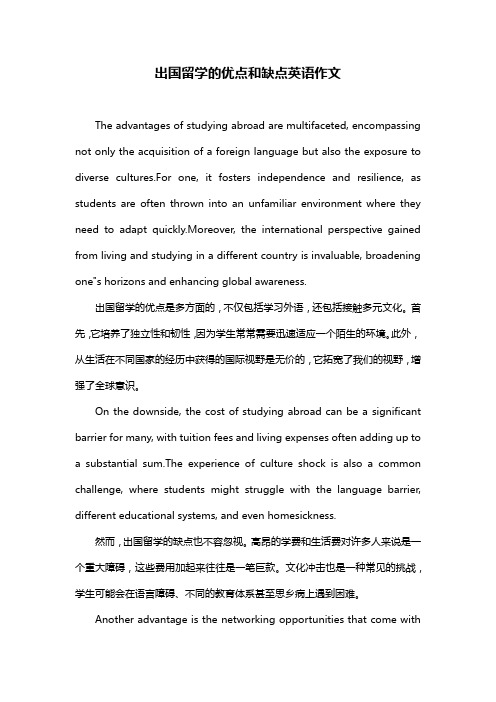
出国留学的优点和缺点英语作文The advantages of studying abroad are multifaceted, encompassing not only the acquisition of a foreign language but also the exposure to diverse cultures.For one, it fosters independence and resilience, as students are often thrown into an unfamiliar environment where they need to adapt quickly.Moreover, the international perspective gained from living and studying in a different country is invaluable, broadening one"s horizons and enhancing global awareness.出国留学的优点是多方面的,不仅包括学习外语,还包括接触多元文化。
首先,它培养了独立性和韧性,因为学生常常需要迅速适应一个陌生的环境。
此外,从生活在不同国家的经历中获得的国际视野是无价的,它拓宽了我们的视野,增强了全球意识。
On the downside, the cost of studying abroad can be a significant barrier for many, with tuition fees and living expenses often adding up to a substantial sum.The experience of culture shock is also a common challenge, where students might struggle with the language barrier, different educational systems, and even homesickness.然而,出国留学的缺点也不容忽视。
出国留学的优缺点英文作文
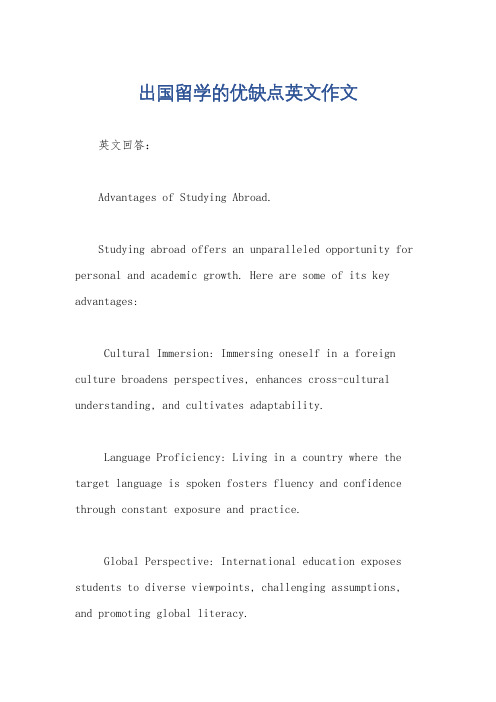
出国留学的优缺点英文作文英文回答:Advantages of Studying Abroad.Studying abroad offers an unparalleled opportunity for personal and academic growth. Here are some of its key advantages:Cultural Immersion: Immersing oneself in a foreign culture broadens perspectives, enhances cross-cultural understanding, and cultivates adaptability.Language Proficiency: Living in a country where the target language is spoken fosters fluency and confidence through constant exposure and practice.Global Perspective: International education exposes students to diverse viewpoints, challenging assumptions, and promoting global literacy.Academic Enrichment: Studying at reputable foreign universities provides access to cutting-edge research, specialized programs, and world-renowned professors.Career Advancement: Graduates with international experience often have a competitive advantage in the job market, as they are equipped with global skills and networks.Disadvantages of Studying Abroad.While studying abroad offers immense benefits, it also comes with certain challenges:Financial Burden: International education can be expensive, with tuition, fees, and living expenses potentially significantly higher than domestic options.Culture Shock: Arriving in a foreign country can initially be disorienting due to unfamiliar customs, social norms, and language barriers.Homesickness: Spending extended periods away from home can lead to feelings of loneliness and nostalgia, which can impact academic focus and well-being.Academic Adjustments: Education systems and teaching methods vary across countries, requiring students to adapt to new learning styles and expectations.Visa and Immigration Requirements: International students must obtain visas and navigate immigration regulations, which can be complex and time-consuming.中文回答:出国留学的优点。
出国留学利弊英文作文
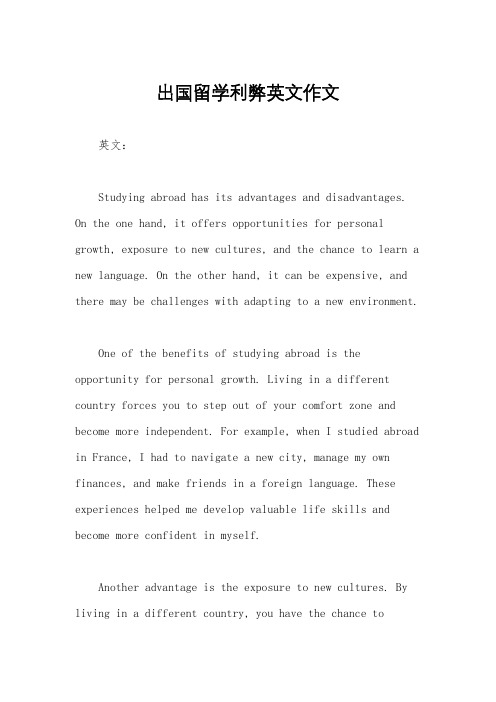
出国留学利弊英文作文英文:Studying abroad has its advantages and disadvantages. On the one hand, it offers opportunities for personal growth, exposure to new cultures, and the chance to learn a new language. On the other hand, it can be expensive, and there may be challenges with adapting to a new environment.One of the benefits of studying abroad is the opportunity for personal growth. Living in a different country forces you to step out of your comfort zone and become more independent. For example, when I studied abroad in France, I had to navigate a new city, manage my own finances, and make friends in a foreign language. These experiences helped me develop valuable life skills and become more confident in myself.Another advantage is the exposure to new cultures. By living in a different country, you have the chance toimmerse yourself in a new way of life and gain a deeper understanding of the world. For instance, during my time in Japan, I was able to participate in traditional tea ceremonies, visit ancient temples, and learn about the customs and traditions of the Japanese people. These experiences broadened my perspective and enriched my lifein ways that would not have been possible if I had stayedin my home country.However, studying abroad also has its drawbacks. One of the main disadvantages is the cost. Tuition, living expenses, and travel can add up to a significant financial burden. Additionally, there may be unexpected expenses, such as medical emergencies or visa issues, that canfurther strain your budget. When I studied in Australia, I had to carefully budget my money and make sacrifices in order to afford my living expenses. It was a challenging experience that taught me the value of financial responsibility.Another downside is the challenge of adapting to a new environment. Language barriers, cultural differences, andhomesickness can make the adjustment period difficult. For example, when I first arrived in Germany, I struggled to communicate with locals and felt isolated from my friends and family back home. It took time and effort to overcome these obstacles and feel at home in my new surroundings.In conclusion, studying abroad has both advantages and disadvantages. It offers opportunities for personal growth and cultural enrichment, but it can also be expensive and challenging. Despite the drawbacks, the experience of studying abroad is invaluable and has the potential to positively impact your life in countless ways.中文:出国留学有其利与弊。
出国留学的好处坏处英语作文
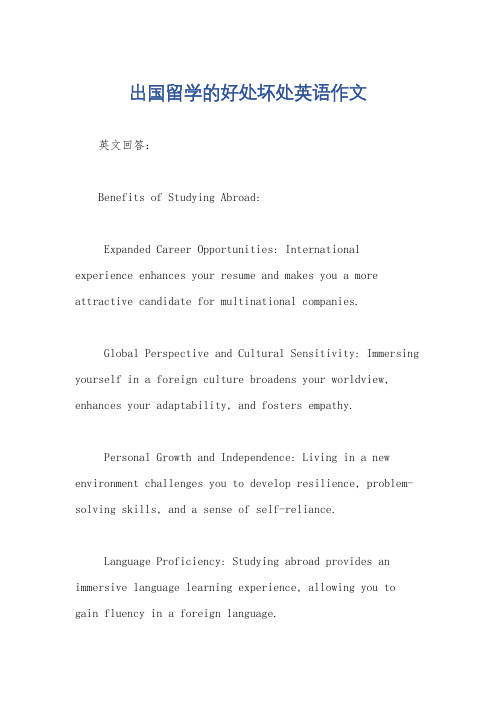
出国留学的好处坏处英语作文英文回答:Benefits of Studying Abroad:Expanded Career Opportunities: International experience enhances your resume and makes you a more attractive candidate for multinational companies.Global Perspective and Cultural Sensitivity: Immersing yourself in a foreign culture broadens your worldview, enhances your adaptability, and fosters empathy.Personal Growth and Independence: Living in a new environment challenges you to develop resilience, problem-solving skills, and a sense of self-reliance.Language Proficiency: Studying abroad provides an immersive language learning experience, allowing you to gain fluency in a foreign language.Networking and Cultural Exchange: You will build a network of international connections and make lifelong friendships with people from diverse backgrounds.Enriched Education: Foreign universities offer unique academic programs, research opportunities, and teaching styles, expanding your knowledge and skills.Adventure and Travel: Studying abroad allows you to explore new countries, experience different cultures, and create unforgettable memories.Enhanced Communication Skills: Interacting with people from various cultures improves your communication and interpersonal skills, making you more effective in global environments.Increased Confidence and Adaptability: Overcoming challenges and adapting to a new culture boosts your confidence and makes you more flexible and adaptable to future endeavors.Appreciation for Diversity and Tolerance: Living in a diverse environment promotes understanding and appreciation for different perspectives and ways of life.Drawbacks of Studying Abroad:Financial Costs: International education can be expensive, including tuition fees, living expenses, and travel costs.Homesickness and Culture Shock: Adjusting to a new culture and being away from family and friends can lead to feelings of homesickness and culture shock.Academic Challenges: Different educational systems and teaching methods can pose academic challenges for students studying abroad.Language Barriers: If you are not proficient in the language of the host country, communication and integration can be difficult.Social Isolation: It may take time to establish social connections and feel a sense of belonging in a foreign environment.Health Concerns: Students studying abroad may experience health issues due to unfamiliar environments, unfamiliar food, or lack of access to familiar healthcare.Limited Time: The duration of study abroad programscan be limiting for students who want to gain extensive experience in a particular field.Readjustment after Return: Transitioning back to your home country after studying abroad can be challenging asyou readjust to familiar surroundings and routines.Safety Considerations: It is important to research the safety of your destination and take appropriate precautions, especially if traveling to a developing country.Emotional Stress: Adapting to a new culture,overcoming challenges, and being away from loved ones can take an emotional toll on students.中文回答:出国留学的优点:拓宽职业机会,国际经历可以提升你的简历,使你在跨国公司中更有竞争力。
出国留学好处和弊端英语作文
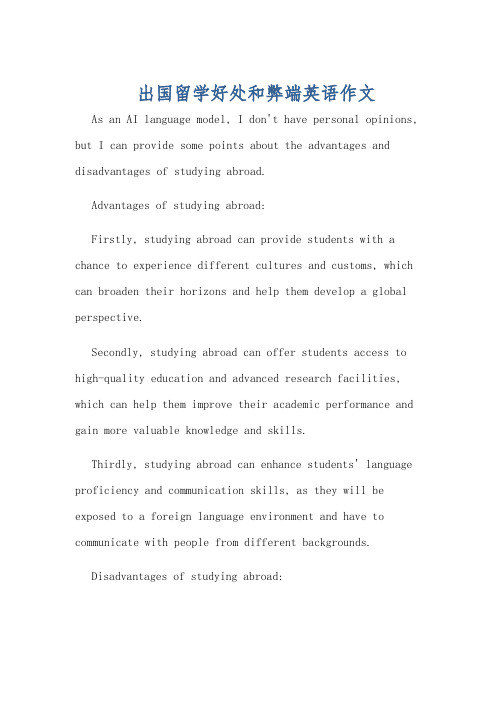
出国留学好处和弊端英语作文As an AI language model, I don't have personal opinions, but I can provide some points about the advantages and disadvantages of studying abroad.Advantages of studying abroad:Firstly, studying abroad can provide students with a chance to experience different cultures and customs, which can broaden their horizons and help them develop a global perspective.Secondly, studying abroad can offer students access to high-quality education and advanced research facilities, which can help them improve their academic performance and gain more valuable knowledge and skills.Thirdly, studying abroad can enhance students' language proficiency and communication skills, as they will be exposed to a foreign language environment and have to communicate with people from different backgrounds.Disadvantages of studying abroad:Firstly, studying abroad can be very expensive,including tuition fees, accommodation, food, transportation, and other expenses, which can put a heavy financial burden on students and their families.Secondly, studying abroad can be challenging, asstudents may face various difficulties and obstacles, such as cultural shock, language barriers, homesickness, and academic pressure, which can affect their mental health and well-being.Thirdly, studying abroad may also pose risks tostudents' safety and security, as they may encounterdifferent social and political situations, such as discrimination, racism, violence, and terrorism, which can endanger their personal safety and health.总之,出国留学有其利有其弊,需要学生根据自身情况和需求来做出决策,并做好充分的准备和规划,以克服各种挑战和迎接各种机遇。
出国留学的好处和坏处英语作文
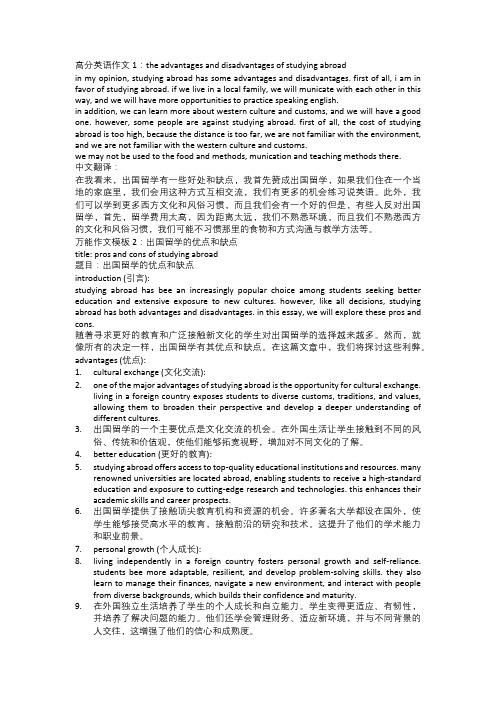
高分英语作文1:the advantages and disadvantages of studying abroadin my opinion, studying abroad has some advantages and disadvantages. first of all, i am in favor of studying abroad. if we live in a local family, we will municate with each other in this way, and we will have more opportunities to practice speaking english.in addition, we can learn more about western culture and customs, and we will have a good one. however, some people are against studying abroad. first of all, the cost of studying abroad is too high, because the distance is too far, we are not familiar with the environment, and we are not familiar with the western culture and customs.we may not be used to the food and methods, munication and teaching methods there.中文翻译:在我看来,出国留学有一些好处和缺点,我首先赞成出国留学,如果我们住在一个当地的家庭里,我们会用这种方式互相交流,我们有更多的机会练习说英语。
出国留学有利有弊 英语作文四级
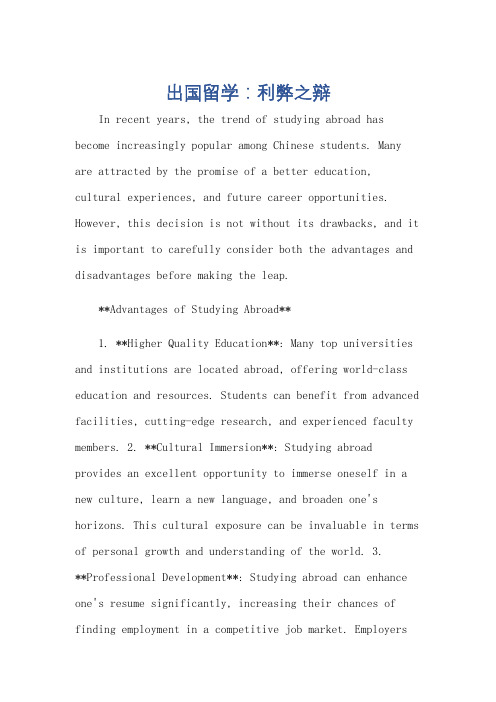
出国留学:利弊之辩In recent years, the trend of studying abroad has become increasingly popular among Chinese students. Many are attracted by the promise of a better education,cultural experiences, and future career opportunities. However, this decision is not without its drawbacks, and it is important to carefully consider both the advantages and disadvantages before making the leap.**Advantages of Studying Abroad**1. **Higher Quality Education**: Many top universities and institutions are located abroad, offering world-class education and resources. Students can benefit from advanced facilities, cutting-edge research, and experienced faculty members.2. **Cultural Immersion**: Studying abroad provides an excellent opportunity to immerse oneself in a new culture, learn a new language, and broaden one's horizons. This cultural exposure can be invaluable in terms of personal growth and understanding of the world.3.**Professional Development**: Studying abroad can enhance one's resume significantly, increasing their chances of finding employment in a competitive job market. Employersoften value the international experience and skills gained abroad. 4. **Networking Opportunities**: Studying abroad opens up a world of networking opportunities. Students can meet people from diverse backgrounds, create meaningful relationships, and build a global network that can be beneficial in their future careers.**Disadvantages of Studying Abroad**1. **High Financial Cost**: Studying abroad can be expensive, with tuition fees, accommodation, living expenses, and travel costs all adding up. This financial burden can be a significant deterrent for many students.2. **Cultural Barriers**: While cultural immersion is a benefit, it can also present challenges. Language barriers, differences in customs and traditions, and adjustment to a new way of life can be stressful and difficult to overcome.3. **Isolation and Homesickness**: Being in a foreign country can lead to feelings of isolation and homesickness. The lack of familiar faces, places, and routines can be challenging for some students.4. **Job Prospects**: While studying abroad can enhance one's resume, it does not guarantee employment upon graduation. The job market can becompetitive, and finding a suitable job can be challenging, especially if the student opts to stay in the host country. **Conclusion**Studying abroad offers numerous benefits but also comes with its challenges. It is crucial for students tocarefully consider their goals, financial situation, and personal readiness before making the decision to study abroad. By doing so, they can ensure that they make the most of this opportunity and gain valuable experiences that will benefit them in the long run.**出国留学:利弊之辩**近年来,出国留学已成为中国学生中越来越流行的趋势。
去国外读书优劣英文作文

去国外读书优劣英文作文英文:As someone who has studied abroad, I can say that there are both advantages and disadvantages to pursuing an education in a foreign country.On the one hand, studying abroad allows you to immerse yourself in a new culture and gain a more global perspective. You have the opportunity to learn a new language, make international friends, and experiencedifferent customs and traditions. This can be incredibly enriching and broaden your horizons in ways that studyingat home simply cannot.On the other hand, studying abroad can also be challenging. You may struggle to adapt to a new environment, language, and academic system. You may feel homesick and miss your family and friends. Additionally, studying abroad can be expensive, and you may have to deal with issuesrelated to visas, housing, and healthcare.Despite these challenges, I believe that studyingabroad is ultimately worth it. The experiences and skills you gain from living and studying in a foreign country can be invaluable, both personally and professionally. For example, I studied abroad in Japan and was able to improve my Japanese language skills, gain a deeper understanding of Japanese culture, and make lifelong friends from all overthe world.中文:作为一名曾经出国留学的人,我可以说,去国外读书有优点也有缺点。
国外留学的优缺点英文作文
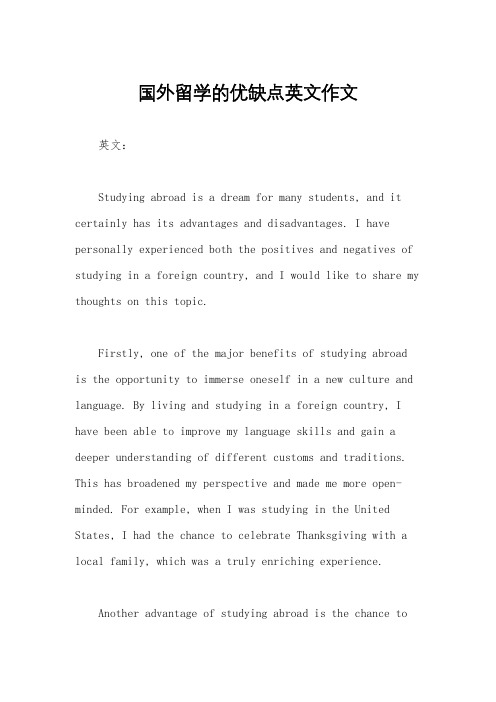
国外留学的优缺点英文作文英文:Studying abroad is a dream for many students, and it certainly has its advantages and disadvantages. I have personally experienced both the positives and negatives of studying in a foreign country, and I would like to share my thoughts on this topic.Firstly, one of the major benefits of studying abroad is the opportunity to immerse oneself in a new culture and language. By living and studying in a foreign country, I have been able to improve my language skills and gain a deeper understanding of different customs and traditions. This has broadened my perspective and made me more open-minded. For example, when I was studying in the United States, I had the chance to celebrate Thanksgiving with a local family, which was a truly enriching experience.Another advantage of studying abroad is the chance togain a global perspective and enhance one's academic and career opportunities. Many universities and colleges overseas offer unique and specialized programs that may not be available in my home country. For instance, I was ableto take a course in sustainable development at a university in Europe, which has greatly enriched my academic knowledge and helped me stand out in my future job applications.However, studying abroad also has its drawbacks. One of the main challenges is the feeling of homesickness and loneliness. Being away from family and friends can be tough, especially during important holidays or celebrations. I remember feeling quite homesick during Chinese New Year when I was studying in Australia, and it was difficult tonot be able to celebrate with my loved ones.Moreover, adjusting to a new educational system and teaching style can be challenging. In my experience, I hadto adapt to a different grading system and teaching methods, which required some time and effort. Additionally, there may be language barriers and cultural misunderstandingsthat can make it difficult to fully integrate into thelocal community.中文:留学国外对我来说既有利也有弊。
出国留学利弊的英语作文
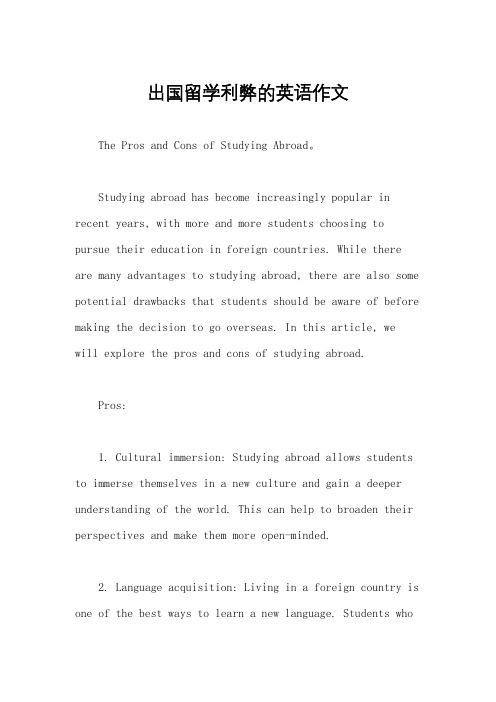
出国留学利弊的英语作文The Pros and Cons of Studying Abroad。
Studying abroad has become increasingly popular in recent years, with more and more students choosing to pursue their education in foreign countries. While there are many advantages to studying abroad, there are also some potential drawbacks that students should be aware of before making the decision to go overseas. In this article, wewill explore the pros and cons of studying abroad.Pros:1. Cultural immersion: Studying abroad allows students to immerse themselves in a new culture and gain a deeper understanding of the world. This can help to broaden their perspectives and make them more open-minded.2. Language acquisition: Living in a foreign country is one of the best ways to learn a new language. Students whostudy abroad can improve their language skills throughdaily interaction with native speakers.3. Career opportunities: Studying abroad can enhance a student's resume and make them more competitive in the job market. Employers value candidates who have international experience and are able to adapt to new environments.4. Personal growth: Studying abroad can be a transformative experience that helps students to develop independence, resilience, and self-confidence. They may also gain a better sense of their own identity and values.Cons:1. Cost: Studying abroad can be expensive, with tuition fees, travel expenses, and living costs to consider. Students may need to take out loans or find part-time work to finance their education.2. Homesickness: Living in a foreign country can be lonely and isolating, especially if students are far awayfrom family and friends. They may struggle to adjust to a new culture and miss the comforts of home.3. Academic challenges: Studying abroad can be academically challenging, as students may need to adapt to a new educational system and different teaching styles. They may also face language barriers and cultural differences that affect their academic performance.4. Safety concerns: Students who study abroad may face safety concerns such as crime, political instability, and natural disasters. They need to be aware of the risks and take precautions to stay safe.In conclusion, studying abroad can be a rewarding and life-changing experience, but it also comes with its own set of challenges. Students need to carefully consider the pros and cons before deciding whether to pursue their education overseas. With careful planning and preparation, however, studying abroad can be a valuable investment in their future.。
出国留学的优点和缺点英语作文

出国留学的优点和缺点英语作文英文回答:Advantages of Studying Abroad:Enhanced Global Perspective: Studying abroad provides an immersive experience in a foreign culture, broadening students' horizons and fostering a deeper understanding of the world. It challenges their perspectives and instills a sense of global citizenship.Improved Language Skills: Immersing oneself in aforeign language environment accelerates language acquisition. Students not only enhance their fluency, but also gain a nuanced understanding of the language's grammar, vocabulary, and cultural context.Academic Enrichment: Studying abroad offers access to specialized programs, unique course offerings, and renowned faculty that may not be available in the home institution.This exposure to a diverse academic landscape enriches students' intellectual development and expands their knowledge base.Personal Growth: Leaving one's comfort zone and adapting to a different environment fosters self-reliance, independence, and adaptability. Students learn to navigate unfamiliar situations, develop a sense of adventure, and gain confidence in their own abilities.Career Opportunities: Studying abroad demonstrates a candidate's adaptability, open-mindedness, and global mindset. It enhances their employability in an increasingly interconnected job market and provides valuableinternational connections.Disadvantages of Studying Abroad:Financial Considerations: Studying abroad can be expensive, involving tuition, accommodation, travel, and living expenses. Students may need to consider scholarships, loans, or alternative financial arrangements to make itfeasible.Culture Shock: Adapting to a different culture can cause initial discomfort and homesickness. Students may experience language barriers, unfamiliar social norms, and cultural differences that can be challenging to navigate.Academic Adjustment: The academic system and grading standards may differ significantly from the home institution. Students may encounter new teaching methods, evaluation criteria, and expectations, requiring adjustments in their study habits.Social Integration: Making friends and building social connections in a foreign country can take time. Students may initially feel isolated or disconnected from their home community, especially if they do not speak the local language fluently.Safety Concerns: While most countries are safe for international students, it is important to be aware of potential risks and take necessary precautions. Studentsshould research their destination thoroughly, adhere tolocal laws, and stay informed about safety issues.中文回答:出国留学的优点:拓宽国际视野,留学可以提供沉浸式的文化体验,开阔学生的视野,培养对世界的深刻理解。
出国留学的优点和缺点英语作文
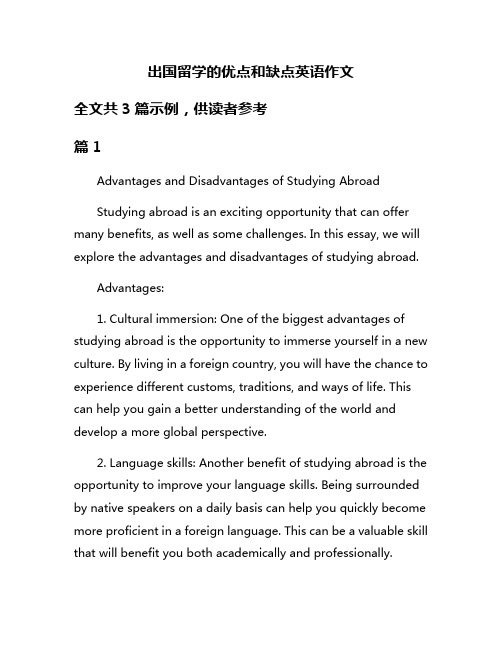
出国留学的优点和缺点英语作文全文共3篇示例,供读者参考篇1Advantages and Disadvantages of Studying AbroadStudying abroad is an exciting opportunity that can offer many benefits, as well as some challenges. In this essay, we will explore the advantages and disadvantages of studying abroad.Advantages:1. Cultural immersion: One of the biggest advantages of studying abroad is the opportunity to immerse yourself in a new culture. By living in a foreign country, you will have the chance to experience different customs, traditions, and ways of life. This can help you gain a better understanding of the world and develop a more global perspective.2. Language skills: Another benefit of studying abroad is the opportunity to improve your language skills. Being surrounded by native speakers on a daily basis can help you quickly become more proficient in a foreign language. This can be a valuable skill that will benefit you both academically and professionally.3. Education quality: Many students choose to study abroad because of the high quality of education available in other countries. By attending a prestigious university or college in a foreign country, you can receive a top-notch education that will enhance your academic credentials and open up new career opportunities.4. Personal growth: Studying abroad can also help you develop personally and grow as an individual. You will be pushed out of your comfort zone and forced to adapt to a new environment, which can help you become more independent, confident, and resilient.5. Networking opportunities: Studying abroad can also provide you with valuable networking opportunities. You will have the chance to meet people from all over the world, including fellow students, professors, and professionals in your field. These connections can be beneficial for your future career prospects.Disadvantages:1. Homesickness: One of the biggest challenges of studying abroad is dealing with homesickness. Being far away from your family and friends can be difficult, especially if you are in a newcountry where you don't know anyone. It can be hard to adjust to a new environment and cope with feelings of loneliness.2. Language barrier: While studying abroad can help you improve your language skills, it can also be a source of frustration and anxiety. Trying to communicate in a foreign language can be challenging, especially if you are not yet fluent. This can make it difficult to interact with locals, navigate daily life, and succeed academically.3. Cultural differences: Living in a foreign country means that you will encounter cultural differences that may be unfamiliar or uncomfortable. You may struggle to adapt to new customs, social norms, and ways of thinking. This can lead to misunderstandings, conflicts, and feelings of alienation.4. Financial costs: Studying abroad can be expensive, with costs that include tuition, housing, food, transportation, and other expenses. It can be challenging to manage a budget and afford the high cost of living in some countries. Financial concerns can add stress and pressure to an already challenging experience.5. Academic challenges: Studying abroad may present academic challenges, such as a different education system, teaching style, and grading system. It can be difficult to adjust toa new academic environment and meet the expectations of professors and peers. This can lead to academic stress, anxiety, and a decline in performance.In conclusion, studying abroad offers many advantages, such as cultural immersion, language skills, education quality, personal growth, and networking opportunities. However, it also comes with some disadvantages, such as homesickness, language barrier, cultural differences, financial costs, and academic challenges. It is important to carefully consider these pros and cons before making the decision to study abroad. Ultimately, the experience of studying abroad can be a transformative and life-changing opportunity that can help you grow academically, professionally, and personally.篇2Advantages and Disadvantages of Studying AbroadStudying abroad is a dream for many students around the world. It offers the opportunity to experience a new culture, learn a new language, and gain valuable skills and experiences that can enhance one's academic and career prospects. However, studying abroad also comes with its own set of challenges anddrawbacks. In this essay, we will explore the advantages and disadvantages of studying abroad.Advantages:1. Cultural immersion: One of the biggest advantages of studying abroad is the opportunity to immerse yourself in a new culture. By living and studying in a foreign country, you can gain a deeper understanding of the people, traditions, and customs of that country.2. Language skills: Studying abroad is a great way to improve your language skills. By interacting with native speakers on a daily basis, you can quickly improve your proficiency in a new language.3. Career opportunities: Studying abroad can enhance your career prospects by providing you with a global perspective and valuable international experience. Many employers value the skills and knowledge gained through studying abroad.4. Personal growth: Studying abroad can help you develop independence, resilience, and adaptability. It can also broaden your horizons, challenge your assumptions, and help you grow as a person.5. Networking: Studying abroad can provide you with the opportunity to build a global network of contacts and friends. These connections can be valuable in both your personal and professional life.Disadvantages:1. Cost: Studying abroad can be expensive, with tuition fees, living expenses, and travel costs adding up quickly. Financial constraints can make it difficult for some students to study abroad.2. Homesickness: Being away from family, friends, and familiar surroundings can lead to feelings of loneliness and homesickness. Adjusting to a new culture and way of life can also be challenging.3. Language barrier: While studying abroad can enhance your language skills, the initial language barrier can make communication difficult and lead to feelings of isolation.4. Cultural differences: Cultural differences can lead to misunderstandings, conflicts, and challenges in adapting to a new way of life. It can take time to adjust to a new culture and overcome cultural barriers.5. Academic challenges: Studying in a foreign language or adjusting to a different education system can be challenging. It may take time to adapt to new teaching styles, expectations, and academic requirements.In conclusion, studying abroad offers a wealth of opportunities for personal, academic, and career growth. However, it also comes with its own set of challenges and drawbacks. It is important to carefully consider the advantages and disadvantages of studying abroad before making the decision to pursue this exciting opportunity.篇3Advantages and Disadvantages of Studying AbroadStudying abroad is a dream for many students around the world. It offers a chance to explore new cultures, improve language skills, and gain a global perspective on life. However, along with the benefits, there are also challenges that come with studying in a foreign country. In this essay, I will discuss the advantages and disadvantages of studying abroad.Advantages:1. Cultural immersion: One of the biggest advantages of studying abroad is the opportunity to immerse oneself in a newculture. Students get to experience new traditions, customs, and ways of life that broaden their understanding of the world.2. Language skills: Studying abroad is a great way to improve language skills. Being surrounded by native speakers helps students practice and improve their language abilities in a natural and interactive way.3. Global perspective: Studying in a foreign country provides students with a global perspective on different issues. They learn to see things from different angles and develop a broader understanding of the world.4. Career opportunities: Studying abroad can open up new career opportunities for students. Employers value candidates with international experience and language skills, making graduates more competitive in the job market.5. Personal growth: Living in a foreign country forces students to step out of their comfort zones and become more independent. It helps them develop resilience, adaptability, and problem-solving skills.Disadvantages:1. Homesickness: Being away from family and friends can bea major challenge for students studying abroad. Homesickness can lead to feelings of loneliness, sadness, and isolation.2. Language barriers: While studying abroad can improve language skills, language barriers can still be a significant challenge. It can be difficult to communicate effectively in a new language, leading to misunderstandings and frustrations.3. Cultural differences: Adjusting to a new culture can be challenging for some students. They may experience culture shock, difficulty in understanding social norms, and discrimination.4. Financial constraints: Studying abroad can be expensive, with costs including tuition fees, accommodation, food, transportation, and travel. Managing finances can be difficult for students on a limited budget.5. Academic challenges: Studying in a different educational system can present academic challenges for students. They may struggle with unfamiliar teaching styles, grading systems, and coursework requirements.In conclusion, studying abroad has both advantages and disadvantages. It offers a unique opportunity for personal andacademic growth, but also comes with challenges such as homesickness, language barriers, cultural differences, financial constraints, and academic challenges. Despite the difficulties, the benefits of studying abroad can outweigh the drawbacks, providing students with a valuable and life-changing experience.。
出国留学的优缺点英文作文
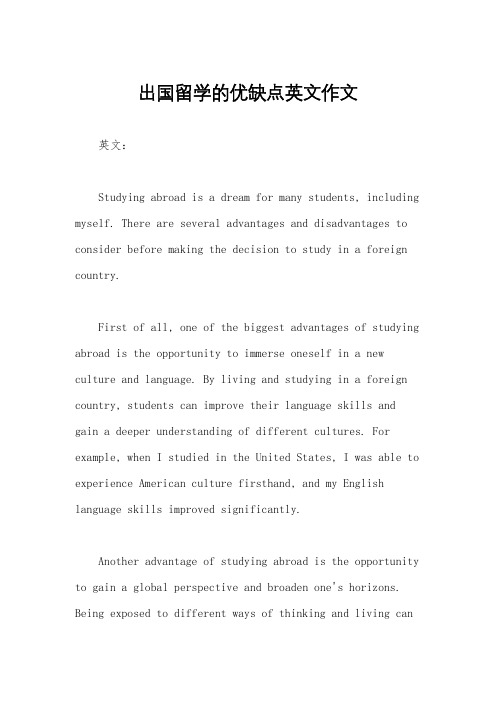
出国留学的优缺点英文作文英文:Studying abroad is a dream for many students, including myself. There are several advantages and disadvantages to consider before making the decision to study in a foreign country.First of all, one of the biggest advantages of studying abroad is the opportunity to immerse oneself in a new culture and language. By living and studying in a foreign country, students can improve their language skills and gain a deeper understanding of different cultures. For example, when I studied in the United States, I was able to experience American culture firsthand, and my English language skills improved significantly.Another advantage of studying abroad is the opportunity to gain a global perspective and broaden one's horizons. Being exposed to different ways of thinking and living canbe incredibly eye-opening and can help students develop a more open-minded and tolerant worldview. For instance, during my time in the UK, I had the chance to meet people from various countries and learn about their perspectiveson global issues, which was a truly enriching experience.However, studying abroad also comes with its challenges. One of the main disadvantages is the feeling of homesickness and loneliness that many students experience when they are far away from their families and friends. It can be difficult to adjust to a new environment and makenew connections, especially when facing language barriers. For example, when I first arrived in Australia, I felt incredibly homesick and struggled to make friends due tothe cultural differences.Additionally, studying abroad can be financially burdensome. Tuition fees, living expenses, and travel costs can add up quickly, and many students find themselves struggling to make ends meet. For instance, when I was studying in Canada, I had to work part-time to support myself, which was a stressful and exhausting experience.中文:出国留学是许多学生的梦想,包括我自己在内。
出国留学的好处和缺点英语作文

出国留学的好处和缺点英语作文英文回答:Benefits of Studying Abroad:Enhanced Educational Opportunities: International universities offer diverse academic programs, research facilities, and world-renowned faculty, providing students with unparalleled learning experiences.Cross-Cultural Immersion: Studying abroad exposes students to different cultures, customs, and perspectives, broadening their horizons and fostering cultural sensitivity.Increased Language Proficiency: Living in a foreign country immerses students in the target language, dramatically improving their fluency and communication skills.Personal Growth: Studying abroad challenges students to step outside their comfort zones, develop independence, and enhance their self-confidence.Global Citizenship: It promotes a global mindset, fostering empathy, tolerance, and awareness of international issues.Career Advantages: International experience can boost employability, as employers value candidates with cultural sensitivity, adaptability, and a global perspective.Disadvantages of Studying Abroad:Financial Burden: Studying abroad can be expensive, including tuition, accommodation, travel, and living expenses.Culture Shock and Homesickness: Adjusting to a new culture and environment can be challenging, potentially leading to culture shock and homesickness.Academic Challenges: Different educational systems and teaching methods may require students to adapt quickly and adjust to new academic expectations.Language Barrier: Students may face difficulties communicating effectively if they are not proficient in the local language.Social Isolation: Moving to a foreign country can make it challenging to establish social connections and build a support system.Safety Concerns: Some countries may have safety risks that students need to be aware of and take precautions for.中文回答:出国留学的好处:教育机会增多,海外大学提供多元化的学术课程、研究设施和世界著名的教授,为学生提供了无与伦比的学习体验。
- 1、下载文档前请自行甄别文档内容的完整性,平台不提供额外的编辑、内容补充、找答案等附加服务。
- 2、"仅部分预览"的文档,不可在线预览部分如存在完整性等问题,可反馈申请退款(可完整预览的文档不适用该条件!)。
- 3、如文档侵犯您的权益,请联系客服反馈,我们会尽快为您处理(人工客服工作时间:9:00-18:30)。
开场(张太伟)
Nowadays, many people like to study abroad. Studying abroad is often considered as a great opportunity which will lead to bright future in one's ride of passage. Not only can we learn different cultures and knowledge from foreign countries, studying abroad can also enrich our lives.One coin has two sides. Likewise, different people have different minds. Conservative and negative concerns about studying abroad have been gradually emerging from our society. People start to wonder what goes wrong with studying abroad. There are a couple of issues worth of our discussions.
优势1(张俊杰):
In my opinions ,I think studying abroad is advantageous. The most obvious advantage to overseas university study is real-life use of a different language. While a person can study a foreign language in his or her own country, it cannot compare with constant use of the language in academic and everyday life. There is no better opportunity to improve second-language during one’s studies offers a distinct advantage whe n one is applying for jobs back home that require the language.
缺点1(赵永康):
I do not agree with your point of view. Disadvantages of studying abroad may affect one's life culturally and economically. We Chinese will experience cultural shocks if we study abroad and live in another country.
Some peers may not be able to adapt to a new environment of their studying and living, which may be very different from that of theirs. Life is beautiful, and it is hard. If one does not feel comfortable with the new culture of another country, he will not be happy about studying in that country.
优势2(张书军):
I don’t think so. Studying abroad, you learn to take care of yourself. Living in another country, even if it is with a host family, means you might be doing things you may not have done in your home country. These include cooking, cleaning, grocery shopping, washing clothes, figuring out transportation, making living arrangements, setting up accounts for cell phones and utilities, etc. You may think of this as a disadvantage, but many international students go home proud that they have become very self sufficient.
缺点2(张太伟):
Do you know studying abroad will cost students a great deal of living expenses Some Chinese students are so academically successful that they receive scholarships in their studies. However, most peers who study abroad do not receive scholarships. Furthermore, they have to deal with many unexpected hardships by living away from their parents and homeland. For example, medical insurance, daily foods, clothes, rents and transportation can generate a large amount of living expenses. Often time,
they need to heavily depend on their parents' overseas monthly payments. 优点3(张书军):
Yes, it may cost a lot of money, but do not spend money to do something Studying abroad, you make memories that will last a lifetime. Your pictures, journals, and souvenirs will help you remember your time abroad, but your memories and emotions of this special time will also be a part of your life until you are very old.
缺点3(赵永康):
Don’t you know studying abroad is very hard. You will probably have times when you miss your family, friends, food, and everything familiar. Almost everyone goes through some culture shock. You will have to realize and accept that it will take some time to adjust to a new way of living.
总结(张俊杰):
In this debate we have not a winner, but we have a common understanding that different people have different views on studying abroad. So how can you know if studying abroad is right for you First, start by talking to people who have already done it. Of course everyone will have his or her own experience and point of view, but it can be really helpful to hear what other people have to say. If you don't know anyone who has studied abroad, ask others about their experiences through the internet.。
